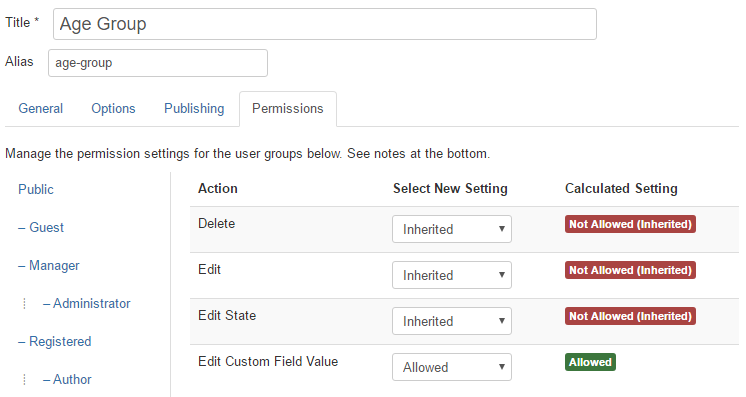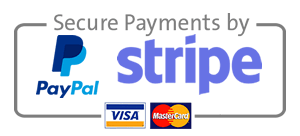These options only apply to the contact views.
Joomla 4
Emails sent from the contact form (and the copy to the submitter) can now be individually formatted to your liking. Go to the System dashboard, Templates section. Click on Mail Templates. Filter by extension to find the available templates. Each email type can be edited for each language used on the site.
| Show title | Whether to show the title or not |
| Title | Give a title to the form. Create language keys for international websites, for instance FORM_TITLE_LABEL. Use language overrides to specify translations for each language used.Note The title replaces the site name in the message subject line |
| Show introduction | Whether to show the introduction or not |
| Introduction | An introduction to the form. Show any content to customize your forms. Content plugins are automatically triggered |
| Allow captcha | Selects the captcha plugin that will be used in the contact form. You may need to enter required information for your captcha plugin in the Plugin Manager. If 'Use Default' is selected, make sure a captcha plugin is selected in Global Configuration |
Name field
| Label | Override the standard name label. The default is ‘Name’. Create language keys for international websites, for instance FORM_NAME_LABEL. Use language overrides to specify translations for each language used.
Example |
| Description | Override the standard description of the name field (tooltip content) Create language keys for international websites, for instance FORM_NAME_DESC. Use language overrides to specify translations for each language used. |
| Pre-fill name | when a user is logged in, the user's name can be automatically added to the form |
| Read-only name | Whether the pre-filled user name is editable or not when a user is logged in |
| Extra field | |
|---|---|
| Add extra field | Use an extra field to complement the sender’s identity |
| Label | Override the label of the extra field. The default is ‘Organization’. Create language keys for international websites, for instance FORM_COMPANY_LABEL. Use language overrides to specify translations for each language used.
Example |
| Description | Override the description of the extra field. The default is ‘Your organization’. Create language keys for international websites, for instance FORM_COMPANY_DESC. Use language overrides to specify translations for each language used. |
| Required | Specify if that field is required when completing the form |
Email field
| Label | Override the standard email label. The default is ‘Email’. Create language keys for international websites, for instance FORM_EMAIL_LABEL. Use language overrides to specify translations for each language used.
Example |
| Description | Override the standard description of the email field (tooltip content). Create language keys for international websites, for instance FORM_EMAIL_DESC. Use language overrides to specify translations for each language used. |
| Pre-fill email | when a user is logged in, the user's email address can be automatically added to the form |
| Read-only email | Whether the pre-filled email address is editable or not when a user is logged in |
| Banned email | Email addresses not allowed to submit contact forms |
Subject field
| Label | Override the standard subject label. The default is ‘Subject’. Create language keys for international websites, for instance FORM_SUBJECT_LABEL. Use language overrides to specify translations for each language used.
Example |
| Description | Override the standard description of the subject field (tooltip content). Create language keys for international websites, for instance FORM_SUBJECT_DESC. Use language overrides to specify translations for each language used |
| Type | The kind of subject to use:
|
| Hidden value | The default value when the subject won’t show |
| Selection options | Line separated values when using the subject as a selection box. Language override COM_TROMBINOSCOPEEXTENDED_FORM_PLEASESELECT to change the ‘Please select:’ |
| Banned subject | Subjects not allowed in the contact form |
Custom fields
| Fields | The custom fields (from the mail context) to place before the message field. Supports the types: calendar, checkboxes, integer, list, radio, text, textarea and url since 3.2 Any custom field (even third party can be used) |
Message field
| Label | Override the standard message label. The default is ‘Message’. Create language keys for international websites, for instance FORM_MESSAGE_LABEL. Use language overrides to specify translations for each language used.
Example |
| Description | Override the standard description of the message field (tooltip content) Create language keys for international websites, for instance FORM_MESSAGE_DESC. Use language overrides to specify translations for each language used |
| Required | Determine if the message field is required |
| Number of rows | The height of the message field (defaults to 10 lines) |
| Banned text | Text not allowed in the contact form body |
Custom fields
| Fields | The custom fields (from the mail context) to place after the message field. Supports the types: calendar, checkboxes, integer, list, radio, text, textarea and url since 3.2 Any custom field (even third party can be used) |
Personalize the Send
button by overriding the COM_CONTACT_CONTACT_SEND language key.
Auto response
| Send auto response | Sends a message to the sender automatically as a response to his request |
| Subject | The subject line for the message |
| Message | The auto-response message. That message can include {name}and {email}, which will respectively be replaced by the sender's name and email |
Other
| Consent confirmation | Joomla 3.9+ Add a consent checkbox to the form if the extension's Confirm Consent content plugin is enabled |
| Send copy to submitter | Hide or show a checkbox to allow copy of email to be sent to the submitter |
| Show optional label | Show the 'optional' label when the fields are not required |
| Feedback message | The thank you message that is shown on the website once the email(s) have been sent successfully. Content plugins are automatically triggered |
| Session check | Check for the existence of a session cookie. This means that users without cookies enabled will not be able to send emails |
| Custom reply | Turns off the automated reply, allowing for plugins to handle integration with other systems |
| Contact redirect | Enter an alternative URL where the user will be redirected to after mail is sent |
| Top offset | An amount of pixels to add or remove to the form's anchor (negative numbers allowed) so that you can tweak the vertical showing of the form when clicking on the contact email address is set up to automatically jumps to the contact form |
Custom fields need to be authorized for editing in order to be usable by the public user in the front end.
For instance:






